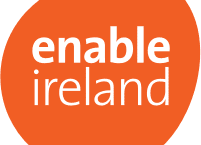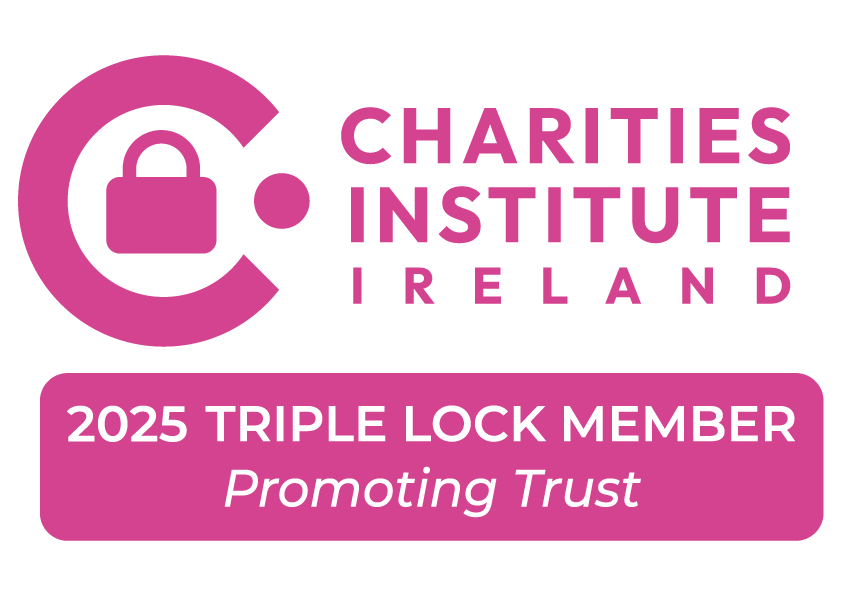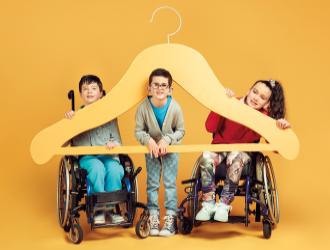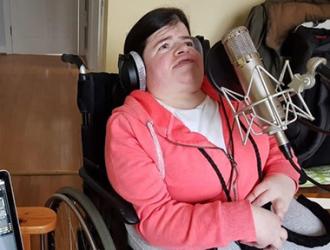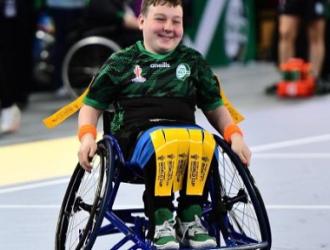A children’s disability network team (CDNT) provides specialised support and services for children who have a disability and complex health needs associated with their disability.
The CDNT supports a child’s development, wellbeing and participation in family and community life. This works best when everyone works together as a team around your child.
The team members share their knowledge, information and skills with you and your family so you can support your child’s development.
This helps children and young people to develop, learn, and take part in everyday activities. Team members can meet children and families in their home, in school or in our office.
Family Forums across Ireland offer a place for families linked with Children’s Disability Network teams to connect with other parents, share their experiences, suggest improvements, and participate in the development of local disability services.
Join Family Representative Catherine to find out more about Family Forums. You’ll hear from a Children’s Disability Network Manager, a Senior Psychologist, and another parent representative. Learn about its benefits, its structure, the information it offers, and more.
For more information about Family Forums visit: www.southeastcdnt.ie/teams/family-forums/
All intervention is aimed at equipping you to help your child at home and in the community. The Individual Family Support Plan will identify the interventions that your child requires. As a team we may offer supports in a variety of formats, depending on the needs and goals identified by your family.
Intervention may be offered in the following ways:
- Parent training and review consultation.
- Inter-disciplinary therapy e.g. the SLT, OT or PT might work together during a session with your child
- Group therapy for children/children and parents/parents only
- Workshops for parents/carers/family members/teachers and SNA’s
- Individual therapy
- Recommendations for home
- Recommendations for school
- School consultation
- Liaising with the NEPS psychologists who provide school based psychological support
Intervention may be in person or via telephone consultation or video consultation/ webinars. The needs of your child will shape the intervention that we will provide to you and your child.
You may be asked to join in during your child’s sessions so that you can support your child in their home environment. We may give you home programmes with activities to follow up on skills practised during the sessions.
Unfortunately, due to limited resources, we are not able to provide access to all services immediately. Your child may be placed on a waiting list for a service. However, we will work with you to provide you with some general supports whilst waiting for services.
CDNT members may work with your child together or separately depending on your child’s needs and the priorities agreed with you. This approach to team working is in line with evidence from international best practice.
The team offers a wide range of supports and services. This may include individual and group therapy, parent education about special needs, support for a child’s full participation in pre-school and school and advice on financial entitlements, housing and transport.
Your family can work together with the CDNT team as equal partners.
The team can do this through:
- information sessions, talks and workshops
- group work
- one-to-one therapy
They match the best type of help with the type of problem your family wants to address. The team may need to try a few different approaches to get the best results.
Information sessions, talks and workshops
Information sessions, talks and workshops for families can cover:
- how to help your child sleep through the night
- toilet training for children who have extra needs
- supporting your child to develop their language and communication
- how to prepare your child for the move from primary to secondary school
- how to help your child play with other children and develop friendships
Group work
Group work is for children who have similar needs. Bringing children together in groups is more fun for them and they can learn from each other.
It also brings together parents who have common challenges. This gives you a chance to meet other parents, and share your ideas and experiences.
Examples of group work include:
- Hanen programmes for developing communication
- Triple P Positive Parenting Programmes
- Family Lámh Course
One-to-one therapy
These are interventions that address your child’s individual needs. Your child may have difficulties with movement, communicating, feeding, eating, drinking, or swallowing.
Difficulties with movement - If your child has difficulties with their movement or posture, they will get an assessment by a physiotherapist or an occupational therapist.
Your family and the therapists will agree on a plan. This could include treatment or equipment.
Some children may need a specialised service. This could include a review by an orthopaedic doctor. This is a doctor who specialises in muscles, bones and joints.
Difficulties with feeding, eating, drinking and swallowing - There may be many reasons why this is an issue for your child. A full assessment may include help from several healthcare professionals.
You will need to bring your own food and drink from home so the team can assess what your child eats and drinks.
After the assessment, your family and the team will agree on a plan.
Difficulties with communication - Your child will see a speech and language therapist.
Services are delivered through an Interdisciplinary Team. This is a group of different health professionals that work together and in partnership with the child and their family. The child and family are key members of this team. Depending on a child’s need(s), members of the child’s team may include physiotherapy, occupational therapy, speech and language therapy, psychology, Dietetics, nursing and social work.
The team will provide supports for the child across a variety of settings including the home, education settings such as pre-school or school, community settings or the CDNT centre.
The CDNTs operate through a Family-Centred Practice model. This is an approach that focuses on the whole family and not just the child requiring support. It ensures that the family's priorities are considered when setting goals with the family.
Our goal is that all families that have a child attending the CDNT will have a Key contact. The key contact will be named contact and act as a link between the family and the team. They will support families with any queries they may have about their service.
Our goal is that all families attending the CDNT will have an Individual Family Support Plan (IFSP). This is an agreed plan that identifies the child and family’s goals and priorities. The IFSP will also describe supports needed to achieve these goals. The IFSP looks at and documents the child’s strengths and achievements since the last plan was completed. As children grow and develop the goals on their IFSP will change with them.
Our primary goal is to get to know you and your child. To do this we will discuss:
- Your concerns
- What is important to you and your family, in regard to your child’s development
- Daily routines and family life
- Our service
Following this, we will collaboratively discuss the things you would like your child and family to achieve. Together we will set goals to help your child build relationships, take part in activities, and do things for themselves.
All intervention is aimed at equipping you to help your child at home and in the community. The Individual Family Support Plan will identify the interventions that your child requires. As a team we may offer supports in a variety of formats, depending on the needs and goals identified by your family.
Intervention may be offered in the following ways:
- Parent training and review consultation.
- Inter-disciplinary therapy e.g. the SLT, OT or PT might work together during a session with your child
- Group therapy for children/children and parents/parents only
- Workshops for parents/carers/family members/teachers and SNA’s
- Individual therapy
- Recommendations for home
- Recommendations for school
- School consultation
- Liaising with the NEPS psychologists who provide school based psychological support
Intervention may be in person or via telephone consultation or video consultation/ webinars. The needs of your child will shape the intervention that we will provide to you and your child.
You may be asked to join in during your child’s sessions so that you can support your child in their home environment. We may give you home programmes with activities to follow up on skills practised during the sessions.
Unfortunately, due to limited resources, we are not able to provide access to all services immediately. Your child may be placed on a waiting list for a service. However, we will work with you to provide you with some general supports whilst waiting for services.
Children aged from birth to 18 years may be referred for services.
If you have a concern about a child’s development, ‘Children’s Services Referral Form’ can be completed by parents/legal guardians, health and social care professionals, GPs, education professionals, assessment of need officers or case managers. The completed forms can be sent to their local Children’s Disability Network Team. It is essential that signed parental consent is recorded on the referral form.
A referral can be made by a healthcare professional. Or you can make the referral yourself.
To do this:
- Complete the Children’s Services Referral Form (PDF, 106 KB, 11 pages)
- Complete an Additional Information Form for your child
The Additional Information Form lets you describe your child and what your concerns are. It will help to refer them to the right service for them.
Complete the Additional Information Form for children aged:
- 0 to 12 months (PDF, 130 KB, 7 pages)
- 1 to 3 years old (PDF, 204 KB, 10 pages)
- 3 to 6 years old (PDF, 221 KB, 12 pages)
- 6 to 12 years old (PDF, 183 KB, 10 pages)
- 12 to 18 years old (PDF, 166 KB, 9 pages)
These forms allow all CDNTs and disciplines/services to accept and prioritise referrals on a consistent and equitable basis. Completed referral forms can be sent to your local Children's Disability Network Team.
If you require further information or help to complete the referral forms, please contact your local Children's Disability Network Team.
Enable Ireland provides children’s disability services in partnership with the HSE through Children's Disability Network Teams. We do not have services in every area but if we are not the service provider where you live there will be another organisation or the HSE who provides services there. Your address determines which Children's Disability Network Team you should refer your child to.
Look up contact details for all 91 Children's Disability Network Teams and the areas they cover.
Find details for Enable Ireland’s 20 Children's Disability Network Teams.
